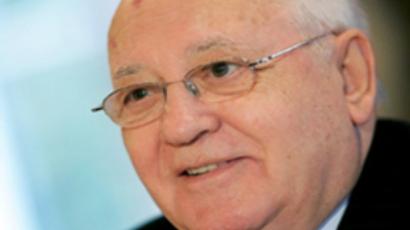Tuesday's press review

This Tuesday Russian newspapers analyse the emerging multi-polar world, look into ‘back door’ options for Ukraine and Georgia’s NATO membership and criticise the rumoured U.S. doctrine of a nuclear strike which can’t be retaliated against.
ROSSIYSKAYA GAZETA publishes a column by Leonid Radzikhovskiy who writes that the multi-polar world which Russian politicians have been speaking about for over a decade is close at hand, and nobody knows what to do with it. The columnist says that for Russian statesmen the notion means a world free of U.S. domination. Because of this anti-American alignment the whole matter of a world where multiple centres of economic and political power have to co-exist has stayed on the back burner for years.
Now, with the power and will of the U.S. for global domination significantly diminishing, such a world becomes a reality. However, he says, it isn’t a reality that most of the seasoned fighters against U.S. domination can swallow without damage to their digestion. The columnist writes that the real thing, meaning the world’s multi-polarity, came as a big surprise in spite of all the talking about it: a kaleidoscope of interests of bigger and smaller countries, no one knowing for sure how many rivalries and enmities inhibit this new world and what new threats it is bringing to us all.
The author says the active foreign policy of President Medvedev may result in the actual birth of a new grouping of global centres, uniting four big countries with the fastest growth rates and potentials on the planet: BRIC (Brazil, Russia, India, China).
KOMMERSANT writes that Georgia and Ukraine, unable now to receive the action plan for NATO membership, are going to enter NATO after all, but through another door. The paper says that under NATO rules there are other instruments than the action plan which can help prepare a nation for joining the alliance. It also says that in Russia many politicians suddenly started defending the statutes and regulations of NATO in the hope of blocking Ukraine and Georgia’s entrance.
They say if there’s no action plan, there cannot be membership. NATO experts retort that Poland and the Czech Republic became members without any action plan. However, continues the paper, it doesn’t mean open support for Georgia or Ukraine. Most NATO officials do not believe that the two nations can become members any time soon: the Ukrainian political crisis and Georgian attack on Tskhinval impose limitations on their hopes, writes the paper.
VREMYA NOVOSTEI writes that according to the U.S. Secretary of State Condoleezza Rice, Ukraine and Georgia ‘will have to go a really long way’ for their NATO membership and that there are no shortcuts on that path. The paper predicts that this time, meaning the December summit of NATO Foreign ministers, neither Kiev nor Tbilisi is going to receive the action plan or any other kind of NATO ‘entry pass’. The paper quotes a Georgian expert who says that if a ‘deeper dialogue’ will be offered to Georgia instead of membership, that would make the whole process even lengthier than it already is. ‘It can take decades,’ continues the paper, quoting the same expert – ‘and in that case, NATO members or not, we need normal relations with Russia.’
NEZAVISIMAYA GAZETA has an article by Eduard Lozanskiy, the president of the American university in Moscow who writes that the U.S. is now saying goodbye to George W. Bush without regret. With the financial crisis going on and the situations in Iraq and Afghanistan, and the nuclear Pakistan deteriorating, Bush goes down in history as one of the worst U.S. presidents ever. He needs a small symbolic victory to leave the scene with his head held high. The author says an attack on Iran is too big an operation for such a short time left to the outgoing president. Then, the only thing that can be attempted, writes the author, is to sneak Ukraine and Georgia into NATO through the back door. The paper says that whatever George W. Bush accomplishes now, it will be Barack Obama’s headache later.
MOSKOVSKI KOMSOMOLETS writes that Georgia and Ukraine caused a breach in NATO unity. Experts quoted by the paper say that it may be an exaggeration. Tatiana Parkhalina of the Center for European Security says that there’s no breach but there is a discussion. European nations, she says, are not very keen on the U.S. initiative of giving the two countries a fast-track treatment. They would rather suggest ‘an action plan without an action plan’ instead. The alliance doesn’t want to absorb all the problems accumulated around Georgia and Ukraine, and have to solve them too. So, says the expert, the Europeans are going to drag their feet as much as possible about Ukraine’s and Georgia’s membership.
KOMSOMOLSKAYA PRAVDA writes that ‘U.S. strategists have developed a new doctrine for nuclear warfare by which the U.S. can strike Russia first and destroy all the Russian missiles in their silos and on launch pads, while missile defense will take care of the remaining Russian weapons.’ The paper says that the new doctrine has been leaked to the media and is now under open discussion in the U.S. The paper also quotes a Russian General of the Strategic Missile Forces as saying that the Russian nuclear arsenal is capable of a retaliation strike under any circumstances. The paper says that special hopes of Russian Generals are vested in the nuclear warhead of the ‘Topol-M’ missile. Its ‘mad’ vertical and horizontal maneuver trajectory cannot be predicted even by the most advanced modern computers.
Evgeny Belenkiy, RT
Realated links:













